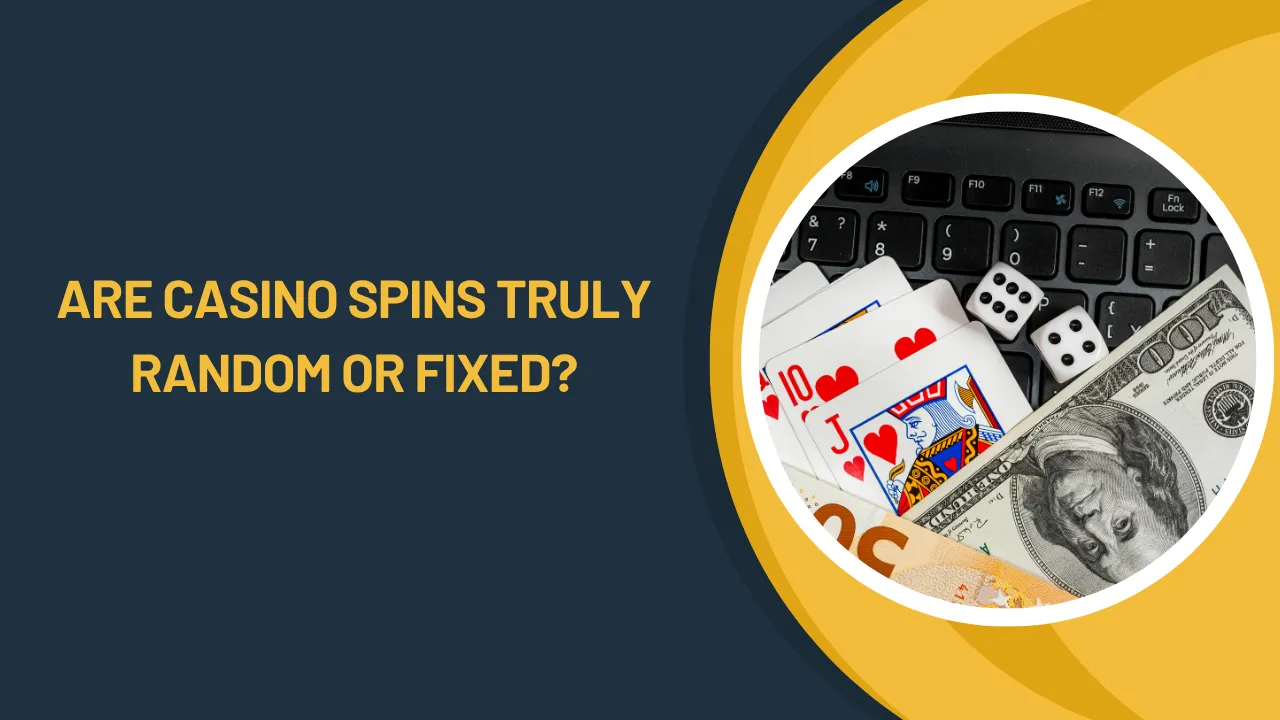It’s a question every casino player asks at some point — are casino spins genuinely random, or are they somehow fixed to ensure the house always wins? Whether you play online slots, roulette, or digital card games, the curiosity about fairness and randomness never quite disappears. Having spent years studying and writing about casino technology, I can confidently say that while chance drives every spin, understanding how it works separates casual guesses from informed insight.
Casinos rely heavily on a balance of probability, trust, and regulation. Players want fun, excitement, and a fair shot at winning; casinos need profit margins without losing credibility. In this balance lies the secret of what makes casino spins both random and reliable — or at least as close as technology allows.
The Role of RNG: How Randomness Is Created
To start with the basics, all licensed casino games — especially digital ones — use what’s called a Random Number Generator (RNG). This is a complex mathematical algorithm designed to produce a constant stream of unpredictable results. For example, when you press “spin” on a slot machine, the RNG has already generated millions of potential outcomes in fractions of a second. The result you see is merely one of them, frozen at the exact millisecond you clicked.
Each spin is independent. That means your previous win or loss has absolutely no influence on what happens next. This “memory-less” property is what keeps games fair. However, it’s easy to understand why some players doubt it. When you hit a dry spell or see patterns that feel “too perfect,” it can seem like something deeper is at play. But mathematically, what appears as a pattern is often just coincidence magnified by our human tendency to find order in randomness.
The House Edge and Player Perception
Here’s the part many players misunderstand: randomness doesn’t mean equality of outcome. Casinos maintain profitability not by fixing spins but through house edge — the statistical advantage built into every game. For example, a slot might pay out 95% over time, meaning the casino keeps around 5% of total wagers as profit. That figure doesn’t mean every player loses 5%; it means across millions of spins, the average return aligns with that percentage.
So when players talk about “rigged” games, they’re often confusing random variance with design probability. A slot can be both fairly random and unprofitable to most players, simply because it’s structured that way. The outcome isn’t manipulated spin by spin — it’s dictated by long-term mathematical balance.
For players exploring different gaming environments, understanding these mechanics becomes even more important. Platforms such as non gamstop casinos, for example, often emphasize fairness and transparency while catering to players outside traditional UKGC restrictions. These casinos rely on certified RNG software from reputable providers to maintain legitimacy, which means the randomness principle applies just as strongly as it does on licensed UK platforms.
Testing and Certification: Proving Randomness
To prove that games are not fixed, independent testing agencies audit casino software. Reputable bodies like eCOGRA, iTech Labs, and GLI perform statistical analysis on RNG outputs, ensuring every possible outcome is equally likely over millions of iterations. They use advanced tools to detect any bias or manipulation and issue certifications only when results pass strict probability thresholds.
This is where regulated casinos stand apart from shady ones. Licensed operators must submit their RNG systems for ongoing audits, sometimes several times a year, depending on jurisdiction. Each version of a game — not just the initial release — is tested to ensure updates don’t alter fairness.
Even land-based slot machines use hardware RNGs. These are physical microchips programmed to mimic random behavior through electrical signals. Every fraction of a second, the chip produces a new random sequence. When you hit the spin button, it stops the process at that exact microsecond — determining your result. Nothing about that can be predicted or influenced externally without tampering with the hardware itself.
Why Some Players Still Believe Spins Are Fixed
Despite all the technical safeguards, skepticism persists. Human psychology plays a huge role in how we interpret randomness. Losing streaks feel deeply personal, while winning streaks seem deserved. This cognitive bias is called the gambler’s fallacy — the mistaken belief that past outcomes influence future ones.
For instance, if a roulette wheel lands on red six times in a row, many players think black is “due.” In reality, each spin remains independent, with the same probability of red or black as before. Casinos thrive on this misconception — not because they exploit it directly, but because players often change their bets based on emotion rather than math.
Online casinos sometimes amplify the illusion with animations, sound effects, and near misses. When two jackpot symbols appear and the third just barely misses the payline, it feels orchestrated — but that sensation is purely psychological. Game designers intentionally use these cues to heighten anticipation, but the RNG result is already decided before the reels stop spinning.
The Role of Software Providers and Fair Play
Not all casino software is created equal. Industry giants like Microgaming, NetEnt, and Playtech have established reputations for transparent algorithms and third-party verification. On the other hand, smaller or unlicensed developers might use weak or unverified RNGs, raising legitimate fairness concerns.
This is why it’s crucial to play on reputable sites that display their audit certificates publicly. Legitimate casinos will often link directly to reports verifying their payout percentages and RNG performance. Transparency not only builds trust but also reassures players that no internal operator can manipulate the odds.
Interestingly, RNGs aren’t the only technology at work. Return to Player (RTP) values and volatility levels define how often and how much a game pays out. A high-RTP slot might offer frequent smaller wins, while a low-RTP game pays larger prizes less often. Both can be random yet behave differently over short sessions, adding to the illusion of patterns or predictability.
Can Casinos Really Manipulate Outcomes?
In licensed environments, manipulation is virtually impossible without getting caught. Modern regulatory systems include real-time monitoring by gaming commissions, which track payout ratios and gameplay logs. Any deviation from expected random distribution triggers an investigation.
However, in unregulated or black-market environments, the story changes. Rogue operators can indeed alter game code or payout triggers. That’s why sticking with recognized regulators — like the UK Gambling Commission, Malta Gaming Authority, or Curacao eGaming — is essential. These organizations enforce player protections and verify that RNG systems remain untampered.
Even for casinos operating under alternative licensing structures, transparency remains the deciding factor. Verified certificates, published RTPs, and responsive customer support all point to fair gaming practices.
The Reality Behind “Hot” and “Cold” Machines
Many players still believe in “hot” or “cold” slots — machines that supposedly go through winning or losing phases. While streaks can occur, they’re purely statistical. Since every spin is independent, there’s no built-in mechanism that causes a machine to tighten or loosen payouts over time.
That said, casinos sometimes rotate slot placements or introduce new titles to refresh engagement. A newly installed machine might seem to pay more initially, but that’s often coincidence combined with heightened player attention. The myth of “timing your spin” has persisted for decades, but it holds no scientific ground.
Embracing Randomness as Part of the Game
Ultimately, randomness is what makes gambling exciting. The thrill of not knowing what’s next is central to the experience. Once players understand that the system is driven by complex math — not manipulation — they can focus on strategy, bankroll management, and entertainment rather than suspicion.
Trustworthy casinos build long-term success on reputation, not deception. Fair randomness encourages players to return, and regulatory audits ensure they have no reason to cheat. So yes, casino spins are truly random — within the mathematical boundaries of each game’s design.
Conclusion
Casino spins aren’t fixed; they’re powered by sophisticated algorithms designed to create truly random outcomes. While the house always maintains a statistical edge, every spin you play has an equal and independent chance of winning. Understanding the mechanics behind RNGs, audits, and licensing helps players make smarter choices and enjoy gambling for what it should be — entertainment rooted in fair play and chance.
Whether you’re spinning online or on a casino floor, remember that the excitement lies in unpredictability itself. The best way to play is not to chase patterns but to appreciate the randomness that keeps the game alive.








